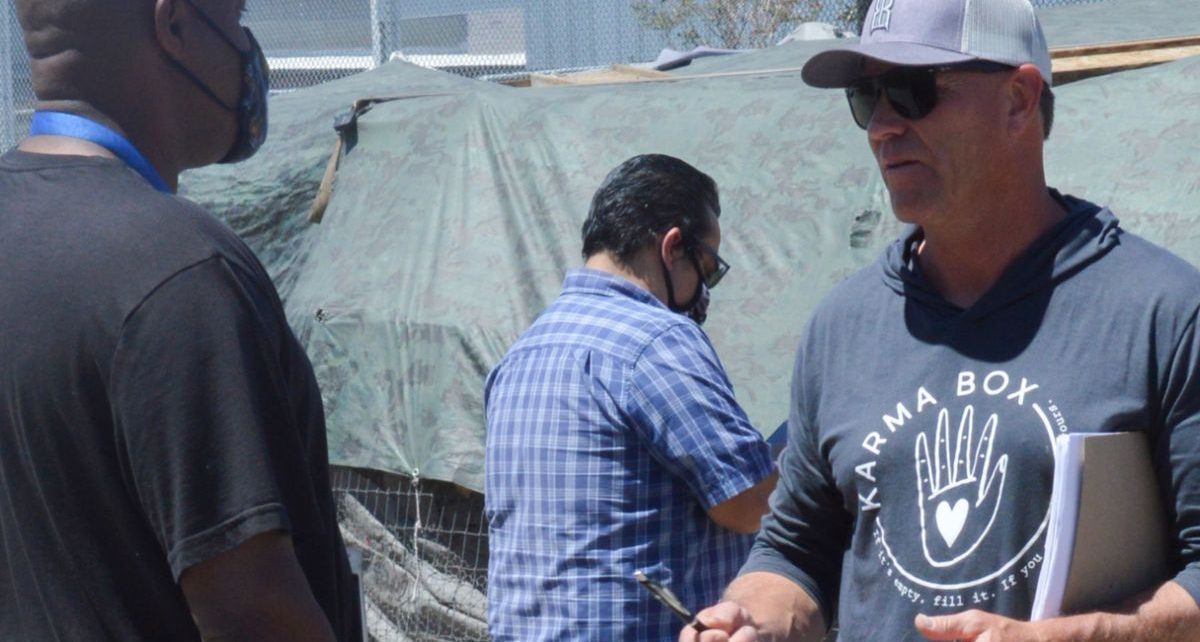
RISE Clean & Safe Program Assists Unsheltered People in Promoting Community Health and Public Safety
By TheNevadaGlobeStaff, August 26, 2022 3:03 pm
Reno City Council approved an 18-month contract with RISE in February to perform Clean & Safe outreach. In April, an update was presented on weekly “huddles,” community engagement, resource deployment, and other topics.
On Wednesday, Council received a six-month update to evaluate how the program was progressing, as asked at the February meeting.
The Clean & Safe program seeks to improve equitable access to public space through a collaborative approach to engagement with our unsheltered neighbors in order to promote community health and public safety.
The Clean & Safe program has four key tenets: education, outreach, enforcement, and restoration.
Along with the Karma Box Project, Join Together Northern Nevada, and the Downtown Reno Partnership, RISE is included in the outreach category.
The RISE outreach team offered 1,881 distinct services to 70 persons from March through July. Twelve persons moved to the OUR Place shelter, two to the OUR Place Senior Home, two to the Eddy House shelter for youths and young adults, and nine to a variety of other facilities and programs such as Mens’ CrossRoads, Village on Sage, and Life Change Center.
“I wanted to share two of the stories of people we’ve helped,” said Clean & Safe team member Antonio Gilmore. “This is very hard work, and it is essential for us to have partners such as RISE to assist us along the way.”
The first story is about a person known only as “S.”
“We met S through one of the community advocates. He was unsheltered for 35 years,” Gilmore explained. “It took us five months to get him housed.”
S has recently moved into his own apartment.
“On the drive to his apartment he stated, ‘I never want to be homeless again,'” Gilmore added.
The second story is about a person known only as “A.”
A had been homeless for ten years. She spent her nights near the courthouse and her days at Barbara Bennett Park.
“We gained her trust after numerous days of doing outreach, and one day she asked for our help,” Gilmore explained.
A and her dog Kika eventually moved to Hope Springs, a tiny houses town with wraparound services run by Northern Nevada HOPES.
“She became like family to the team,” Gilmore explained.
A graduated from Hope Springs last month, and Gilmore said he and the team were honored to be invited.
A has also moved into her own place and continues to communicate with the team on a regular basis.
“These are a couple examples of the people we come across on a daily basis,” Gilmore explained. “Most of these situations take a lot of time and effort and we can’t do this alone. While we do our best to help as many as possible, some people require intensive outreach, and our partnership with RISE is helping with the most service-resistant of the sheltered community.”
Ben Castro, the executive director and founder of RISE, expressed his happiness upon hearing that the program is successful.
“This team has embraced us with open arms,” Castro remarked. “They’ve been nothing but flexible, supportive, collaborative, and we really appreciate their leadership and partnership as we continue to grow.”
Castro detailed some of the project’s accomplishments thus far, including 24 housing arrangements, 31 identification replacements, one family reunification, and 29 resources appraised.
“While 24 might seem like a small number, I really need to emphasize here that these here are some of the most service-resistant individuals within our community,” Castro stated. “The reason they are the most service-resistant is because they are the most traumatized individuals in our community. They have distrust issues for a reason, because they’ve been let down before, whether it be by other service providers, by law enforcement, their families…getting them to trust again is no easy task and I’m extremely proud of our team to be able to motivate them and activate their desire for change.”
Castro also mentioned some people who have benefited from the team’s assistance over the last six months.
The first was “M,” who lived beneath a tree near North McCarran Boulevard.
“When we met M, they were under this tree quietly sobbing to themselves,” Castro explained. “We happened to be in the right place at the right time.”
After about an hour of deliberation with M, the team asked whether they wanted to go right away, and M agreed. When asked if he wanted any of their items, M replied, “No, I want to leave that life behind me.”
The crew drove M to Reno Behavioral Health and sat with them during the intake procedure.
Ten days later, the team received a text message from M, who reported that they had been placed in welfare housing and that they would like the team to come visit them.
“They looked amazing,” Castro added. “hey told us they had prayed for us, and that we had saved their life that day.”
Castro also shared a story about “CJ.”
“When we talk about drops in a bucket, this individual is the whole gallon,” Castro remarked.
Castro indicated that CJ had been interested in services for some time, but the problem was that there are very few service providers who can satisfy the level of need necessary, therefore they were not program-qualified.
CJ had been living behind a tree in Pickett Park for some time, caught in a cycle of hospitalization and homelessness.
“It took us six months to get to where we are today with CJ,” Castro added. CJ is no longer in this park, and we are very close to getting them properly referred to a nursing home that can meet their level of care.”
Castro’s final narrative before the council concerned siblings “JP” and “R.”
JP struggles with substance misuse, whereas R is developmentally impaired. They were residing in the Summit Ridge area, beneath shrubs.
JP would not enter any facility without R, according to Castro.
“They were inseparable.”
Coordination with the pair took months, and after five months, they were both placed in a sober-living transitional facility.
Unfortunately, R was discharged soon after because the degree of care required was greater than what the provider could deliver. However, JP recognized that the greatest way to assist R was to serve the program, get stabilized, and find independent housing, which would be the best way to care for R, according to Castro.
“JP told us that they felt a lot better with R being outside knowing we were there to support them,” Castro added.
Castro addressed what they could expect in the program’s next 12 months, including the introduction of new technology in the field, the expansion of community trust through peer-to-peer involvement, and an increase in community resource liaison referrals.
Mayor Schieve commended Castro and RISE for their efforts and responded to broader criticism directed at the city and the program.
“There are a lot of people who like to criticize – whether it’s on Facebook or Instagram – of us, of what we’re trying to accomplish. That’s really easy to do. But you’re doing the work every day, and you’re making it happen, ” Schieve remarked. “It’s easy to criticize and be judgmental, but Ben, you talk the talk and walk the walk.”
The council expressed its support and praise, adding that RISE has earned a strong reputation among the region’s service providers.
Credits: This is Reno
Copyright 2022 775 Times, NV Globe. All rights reserved.
- Heavy Rains Trigger Flood Alerts Across Las Vegas Valley - July 18, 2025
- Las Vegas Police Officer Suspended Following Arrest by State Authorities - July 18, 2025
- Woman Fatally Struck by Box Truck in Northeast Las Vegas - July 18, 2025




